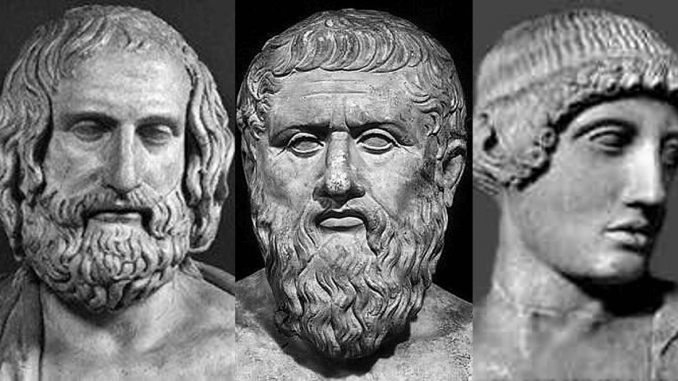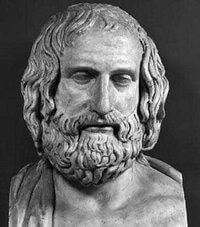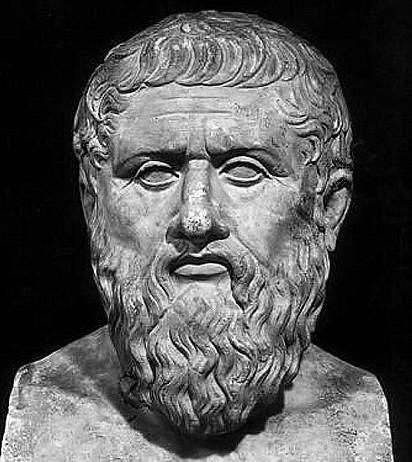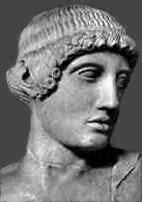
The Sophists – derived from the Greek word sophia meaning wisdom – were professional teachers who offered educational services to the citizens of Greek city-states for a fee. They prepared young men for the challenges and opportunities of political life by teaching them oratory (the art of public speaking) and rhetoric (the art of persuasion). These were important skills in Classical Greece, and in particular Athens, where there were large popular juries and public assemblies that needed persuading.
Although the Sophists were prolific writers, only fragments of their works have survived. We mainly know them through the writing of others, such as Plato. He viewed them as immoral peddlers of clever, but false, arguments who were more interested in winning a debate than putting forward a reasoned or moral case. Indeed, it is largely due to Plato’s criticisms that the term “sophist” continues to hold negative connotations today.
Whether you agree with the Sophists’ ideas or not – and many would argue that Plato unfairly gave them a bad name – one cannot deny that they were important and influential thinkers of their time.
Key Sophist thinkers included:

Protagoras (c. 490 BC – c. 420 BC) He is sometimes referred to as the founder of the social sciences because he shifted the focus of philosophy from the natural world to the human world of politics, ethics and social relations. His famous quote “man is the measure of all things” reflects his argument that human subjectivity determines the way we understand our world – a belief that is often interpreted as an early form of relativism.
Protagoras is the leading character in one of Plato’s most enjoyable and entertaining dialogues, entitled Protagoras. This dialogue begins with the young philosopher, Socrates and his friend Hippocrates discussing Protagoras’s arrival in Athens – an event that is the cause of much excitement given his reputation as one of the most accomplished speakers of the time. Hippocrates pleads with Socrates to speak to Protagoras on his behalf to request his teaching services in exchange for payment. However, Socrates suggests that they should first meet with Protagoras to find out exactly what he is able to teach. Later that day, Socrates and Hippocrates arrive at a gathering of celebrated Greek intellectuals at which Protagoras is present. A lively battle of wits ensues between the young, Socrates and the older, more famous, Protagoras. They discuss a range of matters including the nature of the good life, the role that knowledge plays in the good life, and how knowledge can be acquired. Their intellectual battle makes for a hugely enjoyable read.
Protagoras’s ideas on the nature of knowledge are also discussed in Plato’s Theaetetus. This depicts a dialogue between Socrates and a student named Theaetetus in which they attempt to form a definition of knowledge. Theaetetus puts forward his argument that “knowledge is perception”, a theory which Socrates identifies as being in line with Protagoras’s famous saying that “man is the measure of all things”. Socrates then examines this theory in detail, putting forward his own objections and sketching out Protagoras’s counter-arguments.
While Theaetetus is not an easy read, it provides more useful information on how Ancient Greek audiences interpreted Protagoras’s thought.

Thrasymachus (c. 459 – c. 400 BC) He was a diplomat and famous orator who provided one of the first fundamental critiques of moral values by arguing that justice is simply the will of the strongest man or party within a state. This is captured by his famous quote “justice is nothing other than the advantage of the stronger”.
Thrasymachus’s notion of justice and power is set out in Book I of Plato’s Republic. This depicts a dialogue between Socrates and a number of interlocutors on the question of “what is justice?”. During this dialogue, Thrasymachus offers his view that the ruling party in any established political regime will always make laws that protect their own interests, while simultaneously declaring those laws to be just for their subjects. In other words, he saw justice as simply a tool for the powerful to manipulate the weak within society.
Thrasymachus’s views on justice provide a starting point for Plato’s search for a different kind of political order and, as such, have earned him an important place in the history of philosophical thought.

Gorgias (c.483 – c. 375 BC) He was a famous orator and a master of rhetoric. In his work Encomium of Helen he attempted to argue against the popularly held opinion that Helen of Troy was responsible for the Trojan War. His aim was to take the weaker argument and make it the stronger one. He did this by arguing, amongst other things, that the power of language (logos) or persuasive speech can compel people to act in particular ways. In this sense, Encomium of Helen is not only a powerful example of rhetorical speech, it is also a deeper reflection on the nature and function of language.
Gorgias was also a leading character in Plato’s dialogue, Gorgias, which discusses the power of rhetoric and the nature of those that aspire to public office. In this dialogue, Gorgias argues that rhetoric is an important art, because through its use, the orator can gain the support of the crowd and this gives him power over others. As he puts it:
“What is there greater than the word which persuades the judges in the courts, or the senators in the council, or the citizens in the assembly, or at any other political meeting?—if you have the power of uttering this word, you will have the physician your slave, and the trainer your slave, and the money-maker of whom you talk will be found to gather treasures, not for himself, but for you who are able to speak and to persuade the multitude.”
Other important Sophists included: Hippias, Antiphon, Prodicus and Callicles, all of whom appear in Plato’s dialogues. Plato’s full set of dialogues can be accessed for free via Project Gutenberg – an online library of over 60,000 free eBooks. Further video resources can also be found on our Mind Attic YouTube channel.





